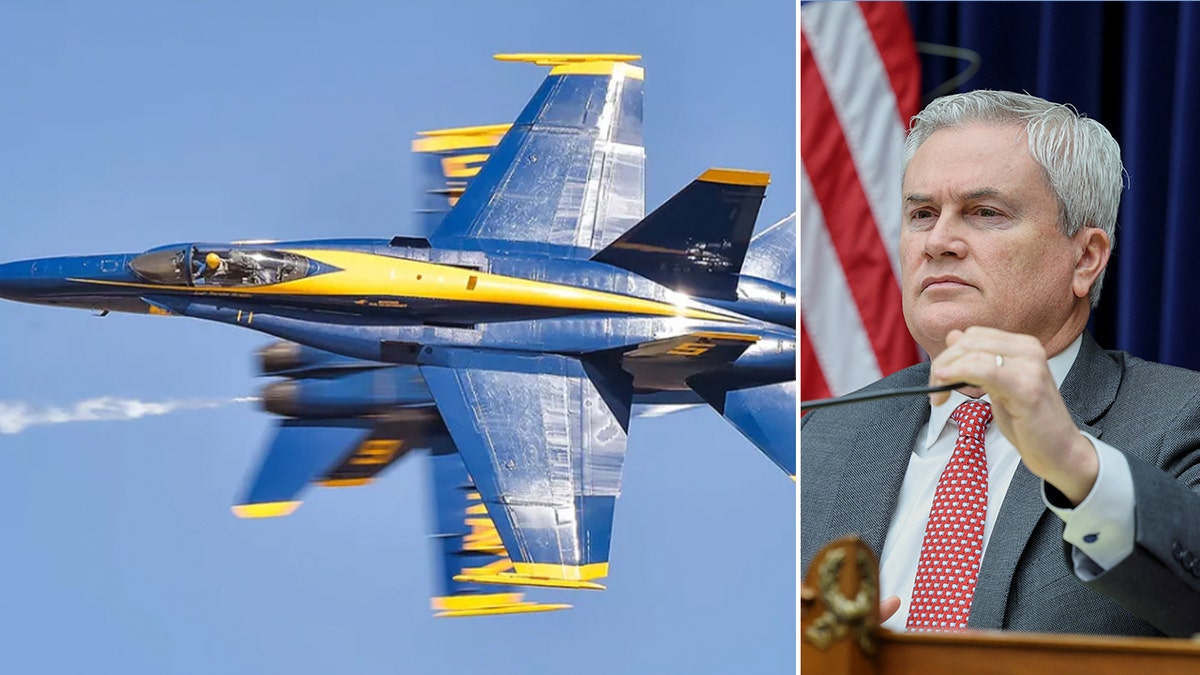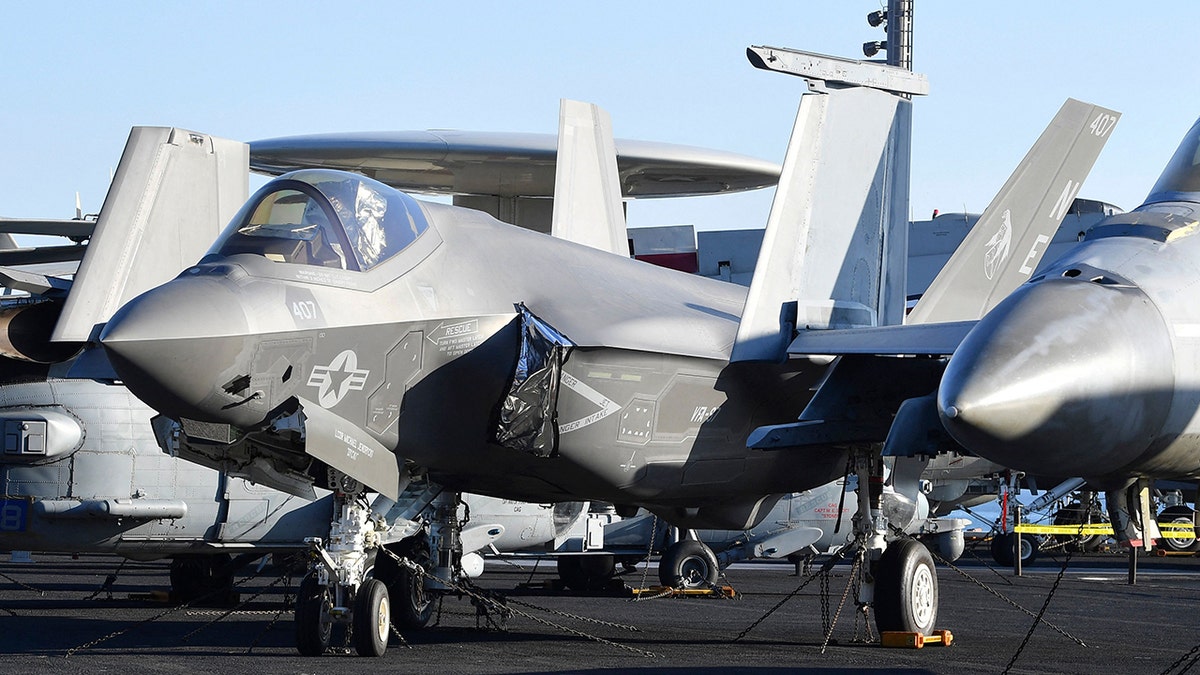NEWYou can now listen to Fox News articles!
FIRST ON FOX: Leaders on the House Oversight Committee are pressing the Navy for answers on the prevalence of traumatic brain injuries among aviators and flight officers, accusing the service of failing to fully understand or address the psychological toll of flight operations.
In a new letter to Navy Secretary John Phelan, the lawmakers requested documents and data on brain injuries, cognitive dysfunction and mental health issues in the fleet, warning that the Navy has never conducted a comprehensive investigation into the risks facing pilots.
“The Committee is concerned that the Navy is failing to adequately understand or address the underlying causes of traumatic brain injuries, cognitive dysfunction, and mental health issues affecting aviators and flight officers,” reads the letter by Oversight Chair James Comer, R-Ky., and Rep. William Timmons, R-S.C., chair of the Military and Foreign Affairs Subcommittee.

Congress is requesting more information on brain injuries seemingly associated with fighter jet pilots who operate at high speeds. (US Navy;Reuters )
“The lack of information on this issue also raises concerns about the adequacy of the information that is being provided to Congress and decisionmakers regarding the health and welfare of our warfighters,” it went on.
“It is critical that the Navy take all necessary steps to identify the potential health risks facing aviators and flight officers.”
The letter requested all “reports, statistical data, medical studies, situational assessments, and substantive communications, including memoranda or email attachments, relating to F-18 aviator mental and physical health and/or suicide from January 1, 2023, to the present.”
THE FUTURE OF AIR COMBAT: HOW LONG WILL THE US MILITARY STILL NEED PILOTS?
It specifically demanded information related to the cases of six different aviators, whose names have been redacted.
The Navy did not return a request for comment before publication deadline.
Earlier this year, Comer and Timmons wrote asking for information about a secret Navy TOPGUN project launched in 2024 to study the brain injury phenomena, called Project Odin.
“Landing aboard an aircraft carrier, it’s literally a car crash. It’s the equivalent force of sitting in your driveway, in your car, and having a crane take you up to the second story and dropping you,” Matthew “Whiz” Buckley, a TOPGUN graduate and F/A-18 fighter pilot, told Fox News Digital earlier this year. He said he suffers from the brain injuries scrutinized by the project.

In a new letter to Navy Secretary John Phelan, the lawmakers requested documents and data on brain injuries, cognitive dysfunction and mental health issues in the fleet. (SONG KYUNG-SEOK/POOL/AFP via Getty Images)
“The catapult shot, you go from zero to about 150, 200 miles an hour in a second to a second and a half. So your brain’s kind of being jarred, you know, back and forward.”
“As a fighter pilot, pulling Gs, so I would fight the jet on the edge of consciousness,” said Buckley, referring to the gravitational pull pilots experience when maneuvering tight turns in a jet.
“I’d merge with a bad guy in training, pull seven, eight, nine Gs. When you do that, the blood rushes out of your head.”
Comer wrote earlier this year that the project, which reportedly was adopted without formal approval from Navy Medical and Air Commands, “raises additional questions about the Navy’s knowledge of potential issues and whether it is acting to mitigate these issues in a comprehensive and effective manner.”
Buckley, founder of veterans’ anti-suicide group No Fallen Heroes, said the Navy loves to capitalize on the “cool” factor of flying jets popularized with movies like “Top Gun,” but fails to warn pilots about the risks associated with years of high-speed flights.
NAVY SECRETARY PUSHES REVIEW BOARD TO PURGE DEI FROM NAVAL ACADEMY AND RESTORE ‘WARRIOR ETHOS’
A February New York Times report detailed how a number of F/A-18 Super Hornet crew members suffered brain injuries after years of catapult takeoffs and dogfighting training.
Symptoms included insomnia, anxiety, depression and PTSD-like feelings.
Buckley recalled feeling confusion, forgetfulness, and being quick to anger – symptoms he at first attributed to the Navy’s drinking culture. He said many of those he flew alongside suffered back and neck injuries.
“I remember really being hard on myself, like. Well, what is wrong with you, man? You’re a fighter pilot. You’re on top of the world. What’s wrong with you? So that would cause its own spiral,” he said.
“In 15 years of flying fighters, I’ve lost three F-18 brothers to suicide.”
Many Navy pilots go on to seek jobs in the commercial airline industry, where they often fail to disclose suffering brain injury symptoms on applications.
While the Navy can’t avoid putting aviators through the extreme conditions that combat training requires, Buckley argued the service must do more to make sure veterans receive proper care for the long-term strain of the job.
“The military does an incredible job of training us to do some pretty awful things to another human,” he said.
“But when they’re done with us, they do a pretty crappy job of transitioning us back to being a human.”
He said he fought the Veterans’ Affairs Department for years after they classified his injuries as not service-related.
“One day you go from flying an F-18 Hornet and having a top-secret clearance, the highest level of trust of the government. And when you’re out the next day, you’re a liar, right?”
